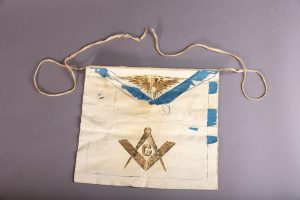Masonic apron
Pictured is a masonic apron (presently missing from our display case) that belonged to one of Golden’s first dentists, Dr. Leslie Anderson. It is over 100 years old. Made of goat skin, cotton fabric, and silk ribbon, it is also painted with symbols of the Freemasons.
 As you can see, the apron used to have blue silk ribbon on its edges, most of which has worn away over its lifetime. Likewise, the painted designs have many losses and discolorations, and the goat skin is stained and misshapen. Due to its fragile state, we have sent this apron to a textile conservator to be cleaned and stabilized so it can last for generations to come.
As you can see, the apron used to have blue silk ribbon on its edges, most of which has worn away over its lifetime. Likewise, the painted designs have many losses and discolorations, and the goat skin is stained and misshapen. Due to its fragile state, we have sent this apron to a textile conservator to be cleaned and stabilized so it can last for generations to come.
What is artifact conservation?
When an artifact is damaged or in a fragile state, a conservator can do things to stabilize it so that it lasts as long as possible in its current condition. Conservation is not to be confused with restoration. While restoration returns an artifact to its original state, conservation attempts to keep an artifact in its current state without causing further damage. Furthermore, restoration lets a viewer see what an artifact looked like when it was brand new, whereas conservation lets a viewer see the natural damage from usage that an artifact has acquired throughout its life.
The work that conservators do is always reversible, not only because it keeps the item as original as possible, but it also allows for new and improved treatments and processes to be applied in the future. For example, a conservator would never use super glue to repair something. Instead, they tend to use natural materials that can be removed or reversed easily, like glues made from animal skin. When sewing, they use knots that are strong but that can be cut and removed easily, and when painting they use only watercolors, which wash away easily.
More conservation information
If you have further questions about artifact conservation, please feel free to contact GHM&P Curator Stephanie Gilmore, at sgilmore@goldenhistory.org or 303-277-8714.


